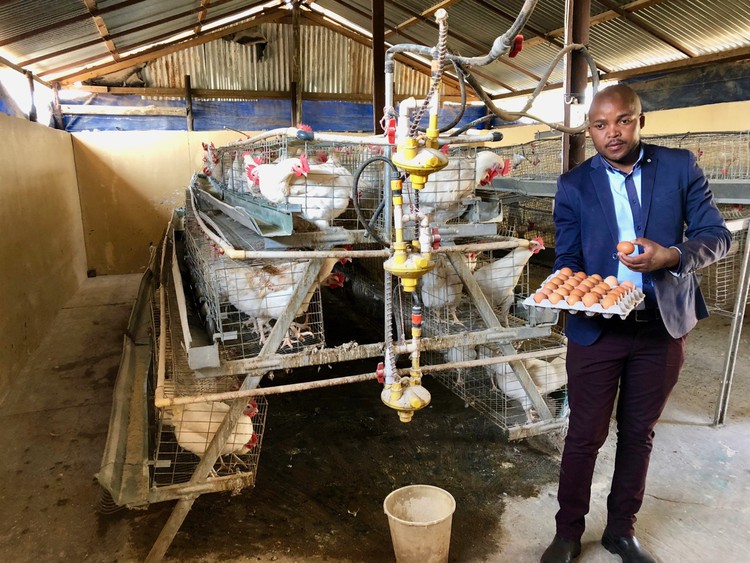Pigs starve as agricultural school teeters on the verge of collapse
“There is so much red tape in this province you will get nowhere” says founder of Eastern Cape school
“As things stand at this moment the school is on the verge of collapsing and if this persists for a month we will have no solution but to close,” says Lwando Rwayi, the principal of Arthur Mfebe Agricultural School in the Eastern Cape. “We have informed the parents and community … Many do try and help, but it won’t be long [before we close].”
Situated on the banks of the Wit-Kei River near Cofimvaba, the school has 1,058 students from grade 10 to grade 12, following a curriculum with three compulsory subjects: agricultural management, agricultural science and agricultural technology.
Rwayi places the financial woes of the school at the door of the Eastern Cape Department of Education for delaying the school’s R1.5 million budget allocation. As a section 21 school the department is meant to deposit the funds at the beginning of the financial year. That was meant to happen in April. Twelve schools are similarly affected.
Now the farm’s 20 pigs are being starved, its crops are failing, and the infrastructure is coming apart. For four months the school has been requesting feed for its pigs.
The farm has also been repeatedly burgled. On Monday, five chickens were stolen.
The school was established in 1958 and converted to an agricultural school in 2011. “It was part of promoting rural development and agrarian economy. It was the community who proposed … to transform the school into an agricultural school,” says Rwayi. “The district municipality in partnership with the Gcaleka traditional leadership donated 17 hectares of land to make sure the initiative became a reality … The Council for Scientific and Industrial Research and the Department of Science and Technology designed the school to become a flagship.”
When the school was converted to agriculture, promises were made of new sheds, bigger chicken facilities, tractors and equipment. It was also meant to get a borehole because the small dam that supplies the farm runs dry.
According to Rwayi, everything was going smoothly until the national education department diverted the budget to the Eastern Cape Department of Education in Bhisho.
“Since then we have been surviving by selling the farm produce to buy feed for our animals and pay temporary workers. We are now so destitute that we had to let five workers go,” says Rwayi.
He said Bhisho sends him from pillar to post. “Everytime they tell us it’s [budget] being processed and soon enough we will get … But to no avail.”
The farm manager, Thula Stuurman, said, “You cannot run a farm without implements and tools … We need a tractor; the infrastructure is depleted … Almost every week we get broken into.”
Stuurman says the school submitted its needs and budget a long time ago. He does not understand the long wait, and the end of the school year is approaching.
“Our students need to acquire practical skills and also to learn how to market and sell their produce, but if we cannot even access water, how are we going to run this place?” asked Stuurman.
Community member and one of the founding fathers of the school, David Mfebe, said, “How can you start an agricultural school without the necessary implements? Former MEC of Agrarian and Land Reform Mlibo Qoboshiyane adopted the school but his department has done nothing to help bolster the capacity of this institution.”
Mfebe says that the involvement of the Department of Agriculture is vital. “But there is so much red tape in this province you will get nowhere,” said Mfebe.
Eastern Cape Department of Education spokesperson Malibongwe Mtima said the problem was that there were no “norms and standards” for agricultural schools. Other schools received R1,100 per learner per month, he said, “but how do we then allocate budgets to these schools?”
“We have then decided to decentralise the budget so that schools can request funding from their districts.”
“Funding is available but we have to be extra careful when allocating the money. We cannot give one school millions and not have control over it because Treasury will view that as mismanagement. We hope by the end of this week we will able to solve the problem of all these schools,” said Mtima.
Matric student Xolisa Stanford, 19, who hopes to study agriculture next year at Fort Hare University, said, “This is supposed to be a special school where skills development is a priority, but due to many problems the programme is failing the students, especially this year.”
A 17-year-old matric student, Lalandle Siphokazi, said, “I feel very bad about our school. Our teachers are trying their best but nothing is moving”.
Next: Qadi Tribal Council defies City in land occupation
Previous: No progress on Zwelihle police brutality investigation
© 2018 GroundUp.
This article is licensed under a Creative Commons Attribution-NoDerivatives 4.0 International License.
You may republish this article, so long as you credit the authors and GroundUp, and do not change the text. Please include a link back to the original article.



